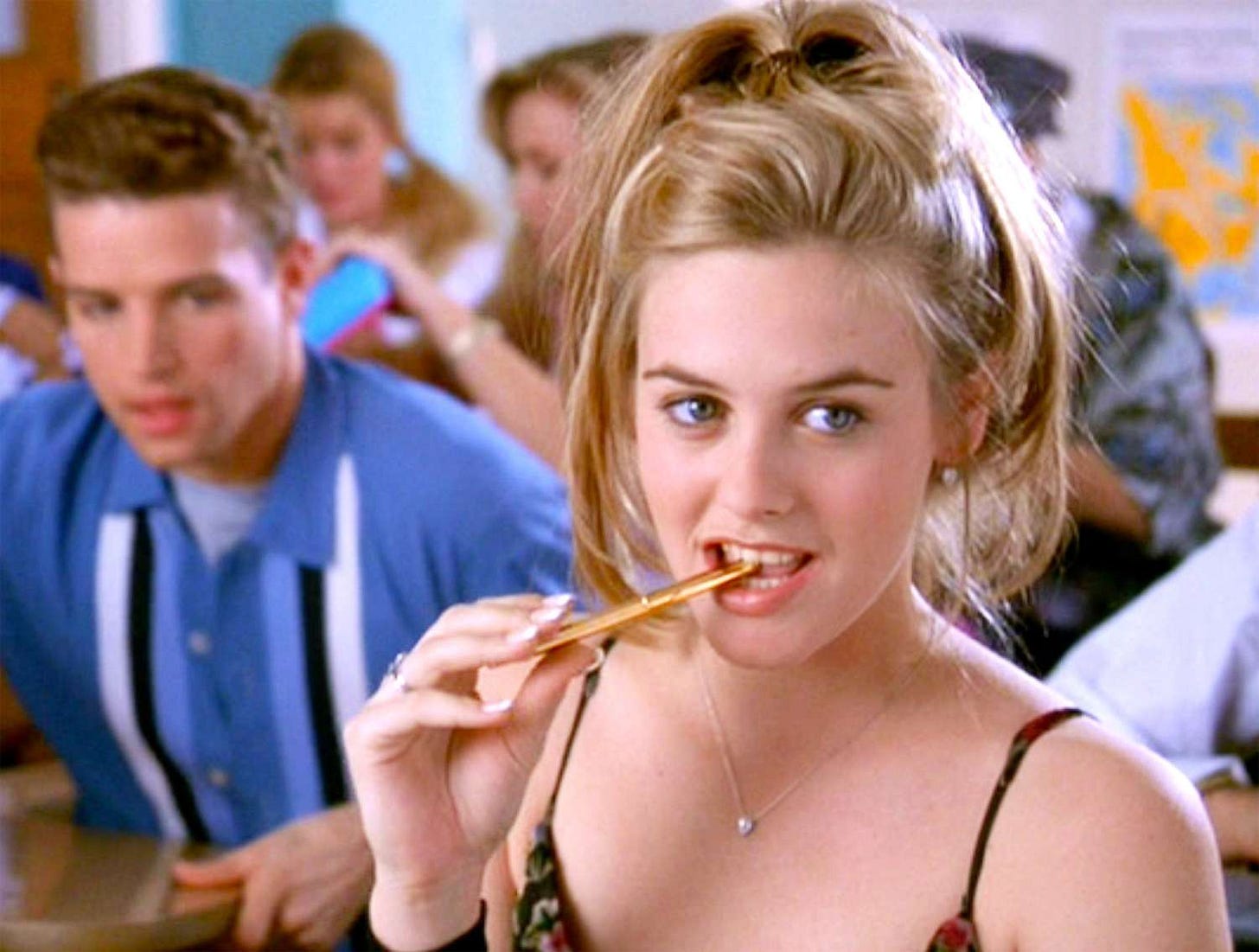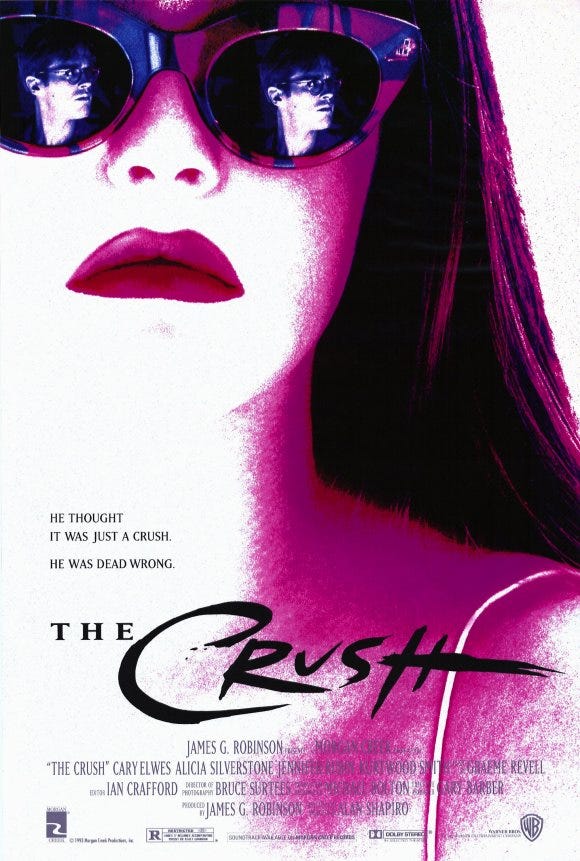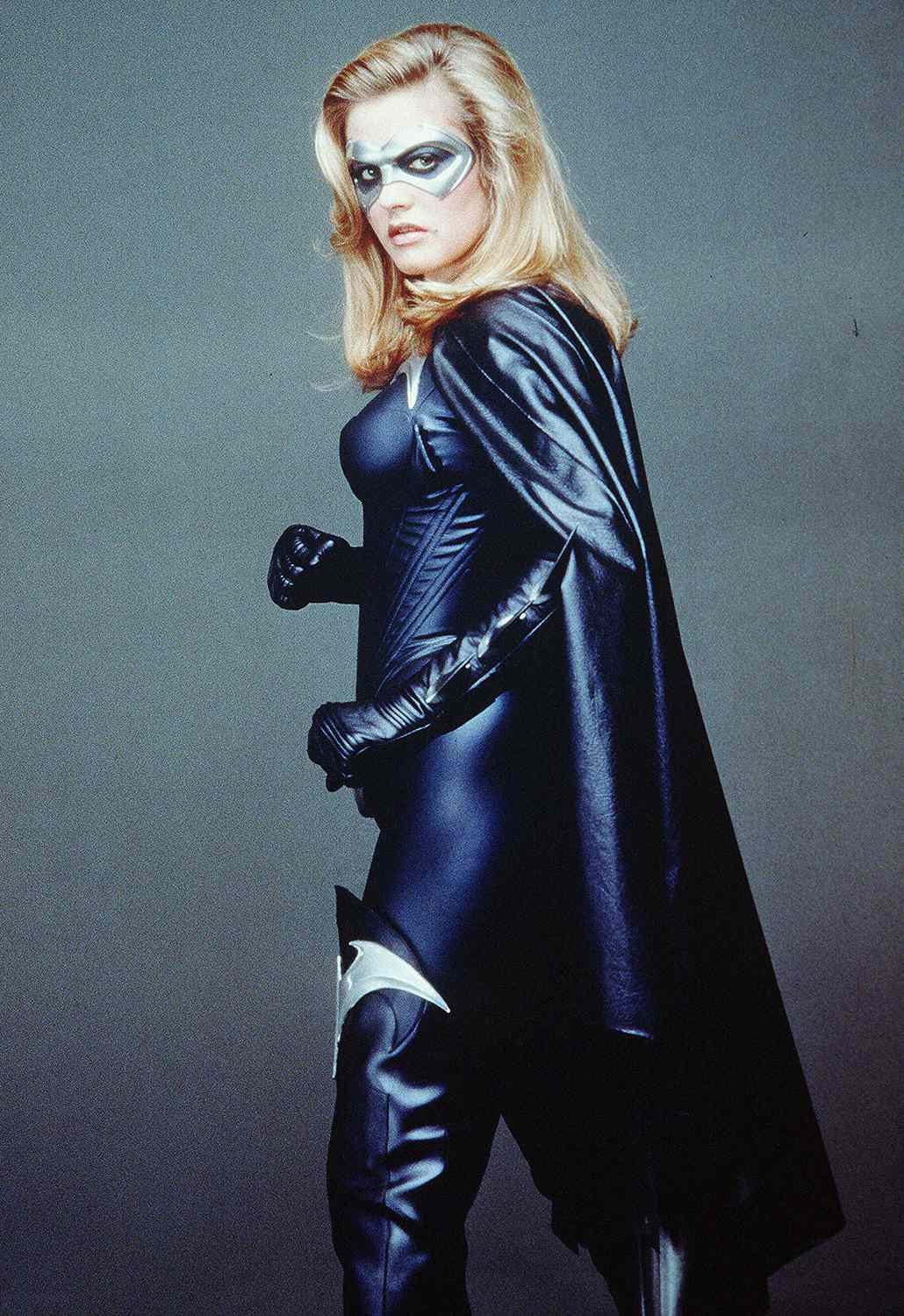Issue 6: Men Couldn’t Be Normal About Alicia Silverstone
Alicia Silverstone sat at the epicentre of the '90s fetish for teen girls, and it was creepy as all hell.
When I was a teenager in the 2000s, there were a lot of famous girls and women my age whose growth into adulthood was documented with feverish anticipation. I celebrated my 16th birthday by hanging out with my family. Newspapers like The Sun celebrated Charlotte Church and Emma Watson turning 16 by making it clear to their readers that these celebs were now old enough for you to legally have sex with. Watson, along with Mary Kate and Ashley Olsen, was the focus of a countdown clock waiting until the stroke of midnight on that particular birthday. The Daily Mail dedicated many articles to describing Kendall and Kylie Jenner as sultry and long-legged when they were in their early teens. Britney Spears was 16 when she bared her midriff in the “Baby One More Time” video and inspired a barrage of drool-heavy coverage.
The Catch-22 of female adolescence and sexual awakening is smothering: your maturation is simultaneously fetishized and scorned, reminding you that the world desperately wants you to be sexy but without sacrificing your supposed purity. The Blair-Clinton years of the late ‘90s promised liberation from conservative confines right as evangelical purity movements and right-wing tabloid fearmongering reached new peaks. This was a time where society was petrified of teen sexuality, yet eager to package it for the adult masses. A number of girls and women found themselves at the epicentre of this hypocritical boom – Dominique Swain, Britney, Liv Tyler, Brooke Shields, and Alicia Silverstone.
Rolling Stone. "Alicia Silverstone: Ballad of a Teenage Queen." September 7, 1995. Rich Cohen.
Sometimes, an interview lures you in with a false sense of security before flinging its awfulness in your face. Then there’s this profile that opens with this line: "Alicia Silverstone is a kittenish 18-year-old movie star whom lots of men want to sleep with." Well, at least it lets you know from the very beginning that things are going to be gross. This line is immediately followed by Silverstone saying that "what people think about me, of doing with me – it can be gross." I wonder if Rich Cohen, the profiler, thought he was divorced from the leering misogyny of it all by putting these contrasting lines together. The rest of the profile doesn't make him seem any less culpable in the selling of a teenage girl to the masses.
In 1995, Alicia Silverstone starred in new fewer than four films. At the time of the profile's publication, Clueless had become the unexpected hit of the Summer. Most famously, she was the Girl in a trio of Aerosmith videos, where she played a wild teen who goes on an extended journey of rebellion and debauchery. In the third one for the song "Crazy" (one of the band's best), she starred alongside Liv Tyler, the daughter of lead singer Steven. Alicia was 16 when the first video was shot, and she looks undeniably gorgeous in them all. She’s the ‘90s badass chick, the girl who skips school, gets her navel pierced, and swings off a bridge via a bungee rope. She was also, it must be said, positioned pretty undeniably as a sex symbol for boys and men.
The year before this piece, Silverstone was profiled by Interview Magazine, with a photoshoot that styled her as a little girl with a teddy bear and tiny white underwear. The caption read "get ready to be smitten by Hollywood's new mischievous kitten, puuuurrrrrrfect." She was 17 (I'm going to be saying "ew" a lot during this article.) A large portion of Silverstone coverage during her adolescence and early adulthood, such as this Entertainment Weekly piece, is focused on calling her a "sex kitten" or a "Lolita" type. This is largely due to a 1993 film called The Crush, where she played an evil seductress adolescent who preyed upon poor defenceless adult Cary Elwes. To make that film, as the Rolling Stone pieces notes, Silverstone became legally emancipated from her parents at the age of 15. A body double was used for the nude scenes. Alan Shapiro, who directed the film, is quoted here as saying, "I was looking for Gloria Swanson from Sunset Boulevard in a 14-year-old body mixed with Sue Lyon from Lolita." (A pretty common issue with people invoking Lolita is that they almost always demonstrate a total lack of media literacy when it comes to the novel.)
Doing The Crush is positioned as a tipping point of sorts for both Silverstone and her parents. Her mother says that, once her daughter left to do the movie post-emancipation, "This feeling of loss like I lost her. From that day on, it was never quite the same." The writer doesn't interrogate the sheer inappropriateness of a bunch of producers coaxing a teenage girl into getting legally emancipated so she can work adult hours in a movie where she plays a sexualized adolescent who preys on adult men (and without a chaperone, as the Interview piece informs us.) He’s far too busy being googly-eyed and leering towards Silverstone, with lines like “sometimes a quesadilla is just a quesadilla” when he’s having lunch with her.
It's not just him, of course (side-note, but Rich Cohen, who would later go onto co-create the HBO one-season drama Vinyl, was later called out for sexism with a very strange Vanity Fair piece on Margot Robbie, where he seemed genuinely flabbergasted by the fact that she was both hot and Australian.) Paul Rudd, her Clueless co-star, says she has "a seductive quality that goes way beyond her years." When interviewed by a young Jon Stewart, he makes a joke about how he “feels like Joey Buttafuoco all of a sudden.” A Vanity Fair piece by Michael Musto, a man never known for his tact, says Silverstone "exudes pure teenage licentiousness in blood-red lips and do-me pumps - on-screen, anyway."
It’s easy to get numb to the sheer glut of objectification flung at this young woman, especially what was going on at the time. Read a lot of Silverstone interviews from this time and you’ll see two names mentioned frequently: Drew Barrymore, who was in her “wild child” years and had starred in another sexy evil teen movie, Poison Ivy; and Amy Fisher, the teenage girl who had shot the wife of her "lover", 35-year-old Joe Buttafuoco, and become known as the "Long Island Lolita." Karina Longworth has an excellent episode of her Erotic '90s season of You Must Remember This that delves into this trio of unlikely comrades, so I highly recommend you listen to that for more. To sum things up briefly, the media became obsessed with the idea of feral sex-crazed teenage girls who had more power than the adult men who were actually over the age of consent in their lives. The sexualization of teenage girls permeated the entirety of the decade, but it certainly felt like it came to a uniquely ghoulish nadir during this period. The message seemed to be that it was okay for adult men to fetishize teenage girls because they were the “real” seducers.
Silverstone, for her part, is repeatedly insistent, both in the Rolling Stone profile and other interviews from this time, that she is not that girl. She’s not sexy or lascivious. She doesn’t go after guys (her own age or otherwise), and she doesn’t have any interest in being marketed as a sex symbol. “I can’t speculate on how people see me,” she says. “But I do wonder how they can see me as a sex symbol. I can’t see anything about me that equals sex. It’s strange to think of what other people might be thinking of me." Again, she’s 18. Can you blame her for being confused by all of this attention and marketing she has no power over?
Cohen asserts that she is a “girl next door” type, a description that has never been applied to any woman who actually looks like your neighbour. Alicia is, he says, "is a girl you could conceivably date, a girl you did date, even, raised to the highest power. She has the brand-new look of a still-wet painting – touch her and she’ll smudge." Again, her "untouched" quality as an 18-year-old is heralded as her greatest asset. It makes your skin crawl to read a grown man talk about her in this way while she acts like a normal adolescent hanging out with her dog and being seemingly unaware of what her interviewer is thinking.
Alicia is both, per the profile, naïve and calculating, a new-to-the-world starlet who is still savvy about the business. She certainly comes across as a woman with her head on her shoulders regarding issues like money and acting classes, although you're also aware that she's been forced into this kind of maturity via emancipation and a ton of sexy teen roles. The question of pure acting talent doesn't seem to be of interest to Cohen. Silverstone says she wants to "work with directors like Martin Scorsese and Bernardo Bertolucci and with such actors as Al Pacino and Christopher Walken", but Cohen can't seem to form a greater compliment on her acting than describing her as being "hard not to watch." He's not wrong that "just being appealing onscreen makes her of interest." Still, he can't make that seem like a true compliment, especially after drooling over her for thousands of words.
Silverstone got a lot of flack for her acting and ambition. Even though she is legitimately amazing in Clueless, she never truly escaped the presumption that she was a pretty face and little more. After the success of Clueless, which grossed $88 million on a $12 million budget, Silverstone signed a deal with Columbia-TriStar valued between $8 and $10 million. This was rare for any woman in film, but especially one not even old enough to drink. The Los Angeles Times covered the story with the headline, "Carrey! Schwarzenegger! Stallone! Silverstone?" The incredulity over her payday was unavoidable, as it often was for women. Just look at how Demi Moore was lambasted for earning a major payout in the ‘90s, even though she had the box office receipts to back it all up. The L.A. Times piece is generally about inflating salaries for big stars and fear the bubble is about to burst, but Silverstone is seen as “the nail in the coffin.”
(Batman and Robin is great campy fun, admit it.)
After Clueless, Silverstone worked steadily, although she never really got over the flop of Batman & Robin, unlike George Clooney or Arnie. There are some gems in her back-catalogue, but mostly after she stopped being the centre of everyone's attention. Her indie work is often fascinating, including an underrated turn in Yorgos Lanthimos' The Killing of a Sacred Deer and a recent turn in Netflix's Reptile alongside Benicio Del Toro, with whom her chemistry is killer.) Nowadays, she's arguably more notorious for her activism, with a focus on animal rights and the environment, which has veered into anti-vax nonsense and endorsing Robert F. Kennedy Jr. Ew. As if.
For this brief moment in her late adolescence, Alicia Silverstone was thrust into the epicentre of a cultural panic, one that tried to have its cake and eat it. America gained a greater awareness of child abuse and exploitation, but efforts to tackle the problem often veered into hysteria that threw a lot of innocent people under the bus (see the McMartin Preschool panic.) The Clinton Administration brought in laws to tackle images of child sex abuse but there was never a greater hunger in the public imagination for the deceitful slutty teen girl, an image rooted in cruel falsehoods and further manipulation of young girls. We feared strange men in alleyways abducting girls but never paid much attention to the men in suits or those more likely to prey upon kids. As a 1993 article from left-wing publication The New International noted, "only 10 per cent of child sexual abuse is at the hands of total strangers. Over 90 per cent of the offenders are men."
We’ve done a lot of thinking about our collective culpability in the unstoppable commodification of teen sexuality over the past couple of years, particularly following the mass mea culpa regarding Britney Spears. There’s still a lot to be done, if only to stop us repeating the mistakes of our past. Girls and women are able to be more open about their discomfort with being sexualized, but the media at large still sees the virgin/whore complex as an easy route to attention and profit. We don’t get upskirt shots of women getting out of cabs anymore, mercifully, but any woman, like Florence Pugh, showing her nipples on social media is still likely to start a bad-faith furore. The “paedo panic” has returned in full force, mostly directed towards queer and trans people as a way to demonize them as predators, and it’s mostly done by papers like the Daily Mail, who dedicate many articles on the Sidebar of Shame to gawking at famous young women’s Instagram photos. Alicia Silverstone mercifully survived it, but why should we demand that anyone else go through it?
At the very least, I would like dirty old men to stop writing profiles of famous women because it feels like none of them can help themselves. Sometimes the quesadilla is just a quesadilla, Rich.
Thanks so much for reading the latest issue of the Gossip Reading Club. You can find my work littered across the internet. Over on Pajiba, I talked about the rise of Renee Rapp, my searing hatred of body language “experts”, and the TV drama about one of Britain’s biggest miscarriages of justice. For Paste Books, I delved into published fanfiction and its roots in literary history. On Inverse, I wrote about 3D in horror cinema. On Crooked Marquee, I wrote about The Servant, a.k.a. the movie Saltburn wishes it could be. I got to geek out over one of my favourite cancelled-too-soon TV shows, Ultraviolet, for Primetimer.
The first edition of Reading Hollywood, the Gossip Reading Club’s official book club, was free to all, but all future editions will be for paid subscribers only. Our next book will be Watch Me by Anjelica Huston! We'll be talking about the book on January 27. It’s a juicy read so pick it up if you can! Paid gossipers also get This Week in Gossip, a weekly update on major gossip and celebrity stories with my analysis of what’s going on.
The Oscar nominations drop on Tuesday so expect some articles on that and more issues of Oscar Seasoning. If there’s a specific topic about other 2023 awards season you’d like me to cover, let me know!
If you don’t want to pay for a subscription but would still like to support me, I have a Ko-Fi account!









Another insightful piece, Kayleigh. It gives me a lot more empathy for Alicia Silverstone amidst my eye rolling for her parenting narrative and anti vaxxing. And she was legit great in The Babysitters Club, which should have had many more seasons!